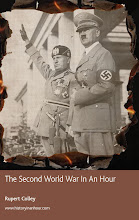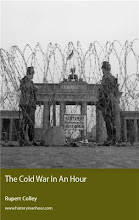
I found an interesting article on the BBC History Magazine blog about Russian president Dmitry Medvedev's criticism of Josef Stalin.
Since 1991, October 30 has been marked in Russia as a day of remembrance for those who perished during the era of Soviet repression. In Moscow an Orthodox priest led an act of memorial in Lubyanka Square, the former headquarters of Stalin's secret police, the dreaded NKVD. Whilst on his video blog, President Medvedev delivered a damning condemnation of Stalin: "Even today you still hear voices claiming that those innumerable victims were justified for some higher national purpose... There is no excuse for repression."
No one would have dared disprove of Stalin, the Party or the nation during his lifetime. If, as a Soviet citizen, you were accused of criticising, whether guilty or not (that didn't matter), you and your family would have been transported east to fester in a gulag for a decade or two. A slip of the tongue, a joke, something misheard would be enough. Equally, if you were envious of your boss's job, or your neighbour's apartment, a word in the right ear would have him removed.
The first open criticism of Stalin came in February 1956, at the Soviet Twentieth Party Congress, when Stalin's successor, Nikita Khrushchev, delivered a six-hour speech to party leaders in which he denounced Stalin's methods, acknowledged his mistakes and criticized his murderous reign. The text of the speech, although secret, soon spread across Russia and abroad, causing shock that the great man's name should be so besmirched but also relief that, through Khrushchev's 'destalinisation', the tyranny that had overshadowed the Soviet Union for so long was now something of the past.
Rupert Colley
www.historyinanhour.com
Since 1991, October 30 has been marked in Russia as a day of remembrance for those who perished during the era of Soviet repression. In Moscow an Orthodox priest led an act of memorial in Lubyanka Square, the former headquarters of Stalin's secret police, the dreaded NKVD. Whilst on his video blog, President Medvedev delivered a damning condemnation of Stalin: "Even today you still hear voices claiming that those innumerable victims were justified for some higher national purpose... There is no excuse for repression."
No one would have dared disprove of Stalin, the Party or the nation during his lifetime. If, as a Soviet citizen, you were accused of criticising, whether guilty or not (that didn't matter), you and your family would have been transported east to fester in a gulag for a decade or two. A slip of the tongue, a joke, something misheard would be enough. Equally, if you were envious of your boss's job, or your neighbour's apartment, a word in the right ear would have him removed.
The first open criticism of Stalin came in February 1956, at the Soviet Twentieth Party Congress, when Stalin's successor, Nikita Khrushchev, delivered a six-hour speech to party leaders in which he denounced Stalin's methods, acknowledged his mistakes and criticized his murderous reign. The text of the speech, although secret, soon spread across Russia and abroad, causing shock that the great man's name should be so besmirched but also relief that, through Khrushchev's 'destalinisation', the tyranny that had overshadowed the Soviet Union for so long was now something of the past.
Rupert Colley
www.historyinanhour.com






No comments:
Post a Comment